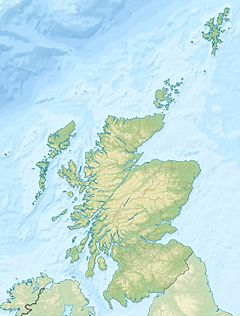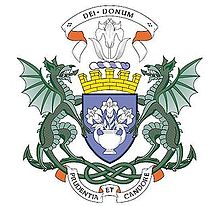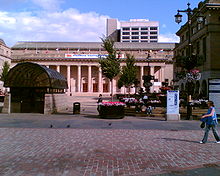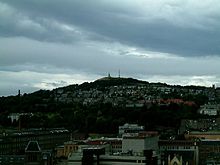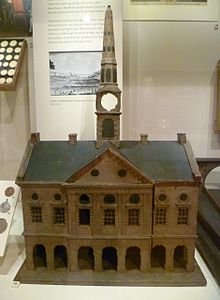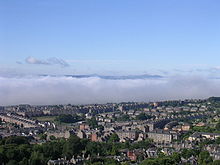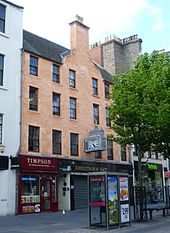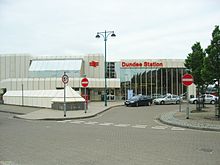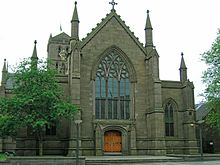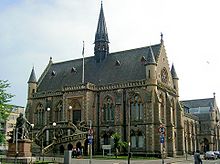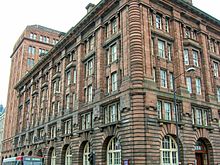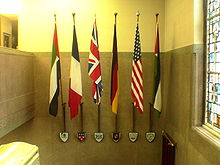- Dundee
-
Coordinates: 56°27′50″N 2°58′12″W / 56.464°N 2.970°W
Dundee Scottish Gaelic: Dùn Dè [1] Scots: Dundee City of Discovery 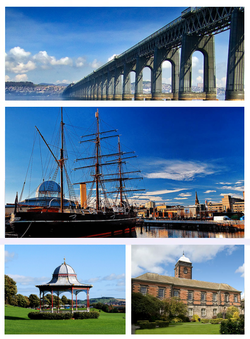
Top: Tay Rail Bridge, Middle: RRS Discovery and City Centre, Bottom left: Magdalen Yard Bandstand, Bottom right: University of Dundee.
 Dundee shown within Scotland
Dundee shown within ScotlandArea 26 sq mi (67 km2) [2] Population 152,320 [3] (2008) - Density 8,541.8 /sq mi (3,298.0 /km2) Language English, Scots OS grid reference NO4030 - Edinburgh 36.3 mi (58.4 km) SSW - London 362.0 mi (582.6 km) SSE Council area Dundee Lieutenancy area Dundee Country Scotland Sovereign state United Kingdom Post town DUNDEE Postcode district DD1–DD5 Dialling code 01382 Police Fire Ambulance Scottish EU Parliament Scotland UK Parliament Dundee East Dundee West Scottish Parliament Dundee City East Dundee City West Angus South North East Scotland Website www.dundeecity.gov.uk List of places: UK • Scotland • Dundee
 i/dʌnˈdiː/ (Scottish Gaelic: Dùn Dè) is the fourth-largest city in Scotland and the 39th most populous settlement in the United Kingdom. It lies within the eastern central Lowlands on the north bank of the Firth of Tay, which feeds into the North Sea. Under the name of Dundee City, it forms one of the 32 council areas used for local government in Scotland.
i/dʌnˈdiː/ (Scottish Gaelic: Dùn Dè) is the fourth-largest city in Scotland and the 39th most populous settlement in the United Kingdom. It lies within the eastern central Lowlands on the north bank of the Firth of Tay, which feeds into the North Sea. Under the name of Dundee City, it forms one of the 32 council areas used for local government in Scotland.The town developed into a burgh in Medieval times, and expanded rapidly in the 19th century largely due to the jute industry. This, along with its other major industries gave Dundee its epithet as the city of "jute, jam and journalism".
In mid-2008, the population of the City of Dundee was estimated to be 152,320. Dundee's recorded population reached a peak of 182,204 at the time of the 1971 census, but has since declined due to emigration.[citation needed]
Today, Dundee is promoted as 'One City, Many Discoveries', in honour of Dundee's history of scientific activities and of the RRS Discovery, Robert Falcon Scott's Antarctic exploration vessel, which was built in Dundee and is now berthed in the city harbour. Biomedical and technological industries have arrived since the 1980s, and the city now accounts for 10% of the United Kingdom's digital-entertainment industry. Dundee has two universities—the University of Dundee and the University of Abertay Dundee. A £300 million master plan to regenerate and to reconnect the Waterfront to the city centre which started in 2001 is expected to be completed within a 30 year period.
Contents
History
The name "Dundee" is made up of two parts: the common Celtic place-name element dun, meaning fort; and a second part that may derive from a Celtic element, cognate with the Gaelic dè, meaning 'fire'.[4]
While earlier evidence for human occupation is abundant,[5] the source of Dundee's success and growth as a seaport town arguably came as a result of William the Lion's charter, granting the earldom of Dundee to his younger brother, David (later Earl of Huntingdon) in the late 12th century.[6] The situation of the town and its promotion by Earl David as a trading centre, led to a period of prosperity and growth.[7] The earldom was passed down to David's descendants amongst whom was John Balliol, the town becoming a Royal Burgh on the coronation of John as king in 1292.[8] The town and its castle were occupied by English forces for several years during the First War of Independence and recaptured by Robert the Bruce in early 1312.[9] The original Burghal charters were lost during the occupation and subsequently renewed by Bruce in 1327.[10]
The burgh suffered considerably during the War of the Rough Wooing of 1543 to 1550, and was occupied by the English forces of Andrew Dudley from 1547. In 1548, unable to defend the town against an advancing Scottish force, Dudley ordered that the town be burnt to the ground.[11] In 1645, during the Wars of the Three Kingdoms, Dundee was again besieged, this time by the Royalist Marquess of Montrose.[12] The town was finally destroyed by Parliamentarian forces, led by George Monck in 1651.[13] The town played a pivotal role in the establishment of the Jacobite cause when John Graham of Claverhouse, 1st Viscount Dundee raised the Stuart standard on the Dundee Law in 1689.[14]
The economy of mediaeval Dundee centred on the export of raw wool, with the production of finished textiles being a reaction to recession in the 15th century.[15] The introduction of two government acts in the mid eighteenth century had a profound effect on Dundee's industrial success. The textile industry was revolutionised by the introduction of large four-story mills, stimulated in part by the 1742 Bounty Act which provided a government-funded subsidy on Osnaburg linen produced for export.[16] Expansion of the whaling industry was triggered by the second Bounty Act, introduced in 1750 to increase Britain's maritime and naval skillbase.[17] Dundee, and Scotland more generally, saw rapid population increase at end of the 18th and beginning of the 19th century, with the city's population increasing from 12,400 in 1751 to 30,500 in 1821.[18]
The phasing out of the linen export bounty between 1825 and 1832 stimulated demand for cheaper textiles, particularly for the production of cheaper, tough fabrics.[19] The discovery that the dry fibers of jute could be lubricated with whale oil (of which Dundee had a surfeit, following the opening of its gasworks) to allow it to be processed in mechanised mills resulted the Dundee mills rapidly converting from linen to jute, which sold at a quarter of the price of flax.[20] Interruption of Prussian flax imports during the Crimean War and of cotton during the American Civil War resulted in a period of inflated prosperity for Dundee and the jute industry dominated Dundee throughout the latter half of the 19th century.[21] Unprecedented immigration, notably of Irish workers, lead to accelerated urban expansion, and at the height of the industry's success, Dundee supported 62 jute mills, employing some 50,000 workers.[22]
The rise of the textiles industries brought with it an expansion of supporting industries, notably of the whaling, maritime and shipbuilding industries,[23] and extensive development of the waterfront area started in 1815 to cope with increased demand on port capacity.[24] At its height, 200 ships per year were built there, including Robert Falcon Scott's Antarctic research vessel, the RRS Discovery. This ship is now on display at Discovery Point in the city.[25] A significant whaling industry was also based in Dundee, largely existing to supply the jute mills with whale oil. Whaling ceased in 1912 and shipbuilding ceased in 1981.[26]
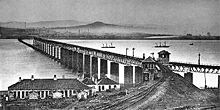 The original Tay Bridge (from the south) the day after the disaster. The collapsed section can be seen near the northern end
The original Tay Bridge (from the south) the day after the disaster. The collapsed section can be seen near the northern end
While the city's economy was dominated by the Jute industry, it also became known for smaller industries. Most notable among these were James Keiller's and sons, established in 1795, which pioneered commercial marmalade production,[27] and the publishing firm DC Thomson & Co., which was founded in the city in 1905 and remains the largest employer after the health and leisure industries.[28] Dundee was said to be built on the 'three Js': Jute, Jam and Journalism.
The town was also the location of one of the worst rail disasters in British history, the Tay Bridge disaster. The first Tay rail bridge was opened in 1879. It collapsed less than a year later during a storm, as a passenger train passed over it, resulting in the loss of 75 lives.[29]
The jute industry fell into decline in the early 20th century, partly due to reduced demand for jute products and partly due to an inability to compete with the emerging industry in Calcutta.[30] This gave rise to unemployment levels far in excess of the national average, peaking in the inter-war period,[31] but major recovery was seen in the post-war period, thanks to the arrival first of American light engineering companies like Timex and NCR, and subsequent expansion into microelectronics.[32]
A £300 million master plan to regenerate Dundee Waterfront is expected to last for a 30 year period between 2001 and 2031.[33] The aims of the project will be to reconnect the city centre to the waterfront; improve facilities for walking, cyclists and buses; replacing the existing inner ring road with a pair of east/west tree lined boulevards; a new civic square and a re-opened dock stretching from the Caird Hall and a regenerated railway station and arrival space at the western edge.[33]
Governance
Dundee was granted Royal Burgh status on the coronation of John Balliol as King of Scotland in 1292.[8] The city has two mottos—Latin: Dei Donum (English: Gift of God) and Prudentia et Candore (With Thought and Purity) although usually only the latter is used for civic purposes.[34]
Prior to 1996, Dundee was governed by the City of Dundee District Council. This was formed in 1975, implementing boundaries imposed in the Local Government (Scotland) Act 1973. Under these boundaries, the Angus burgh and district of Monifieth, and the Perth electoral division of Longforgan (which included Invergowrie) were annexed to the county of the city of Dundee. In 1996, the Dundee City unitary authority was created following implementation of the Local Government etc. (Scotland) Act 1994.[35] This placed Monifieth and Invergowrie in the unitary authorities of Angus and Perth and Kinross, largely reinstating the pre-1975 county boundaries. Some controversy has ensued as a result of these boundary changes, with Dundee city councillors arguing for the return of Monifieth and Invergowrie.[36]
Local government
Dundee is one of 32 council areas of Scotland,[35] represented by the Dundee City Council, a local authority composed of 29 elected councillors. Previously the city was a county of a city and later a district of the Tayside region. Council meetings take place in the City Chambers, which opened in 1933 in City Square. The civic head and chair of the council is known as the Lord Provost, a position similar to that of mayor in other cities. Dundee House, the new headquarters for the city council on North Lindsay Street, opened in August 2011.[37] This has replaced Tayside House which is due to be demolished in early 2012 as part of the Dundee Waterfront improvements.[37]
The council was controlled by a minority coalition of Labour and Liberal Democrats of 12 councillors, with the support of the Conservatives who had five. Although the Scottish National Party (SNP) was the largest party on the council, with 11 councillors.[38][39] Elections to the council are on a four year cycle, the most recent as of 2007 being on 3 May 2007. Previously, Councillors were elected from single-member wards by the first past the post system of election, although this changed in the 2007 election, due to the Local Governance (Scotland) Act 2004.[40] Eight new multi-member wards were introduced, each electing three or four councillors by single transferable vote, to produce a form of proportional representation.
The 2007 election resulted in no single party having overall control, with 13 Scottish National Party, 10 Labour, 3 Conservatives, 2 Liberal Democrats, and 1 Independent Councillors. A March 2009 by election in the Maryfield ward changed the balance to 14 Scottish National Party, 9 Labour, 3 Conservatives, 2 Liberal Democrats, and 2 Independent Councillors.[41]
Westminster and Holyrood
For elections to the British House of Commons at Westminster, the city area and portions of the Angus council area are divided in two constituencies.[42] The constituencies of Dundee East and Dundee West are as of 2010 represented by Stewart Hosie (Scottish National Party)[43] and James McGovern (Labour),[44] respectively. For elections to the Scottish Parliament at Holyrood, the city area is divided between three constituencies. The Dundee East (Holyrood) constituency and the Dundee West (Holyrood) constituency are entirely within the city area. The Angus South (Holyrood) constituency includes north-eastern and north-western portions of the city area.[42] All three constituencies are within the North East Scotland electoral region: Shona Robison (SNP) is the Member of the Scottish Parliament (MSP) for the Dundee East constituency;[45] Joe Fitzpatrick (SNP) is the current MSP for the Dundee West constituency[46] and Graeme Dey (SNP) is the current MSP for the Angus South constituency.[47]
Dundee is also part of the pan-Scotland European Parliament constituency which elects seven Members of the European Parliament (MEP)s using the d'Hondt method of party-list proportional representation.[48] Scotland returns two Labour MEPs, two SNP MEPs, one Conservative and Unionist MEP and one Liberal Democrat MEP, to the European Parliament.[48]
Geography
Dundee sits on the north bank of the Firth of Tay on the eastern, North Sea Coast of Scotland. The city lies 36.1 miles (58 km) NNE of Edinburgh[49] and 360.6 miles (580 km) NNW of London.[49] The built-up area occupies a roughly rectangular shape 8.3 miles (13 km) long by 2.5 miles (4 km) wide, aligned in an east to west direction and occupies an area of 60 km2.[50][51] The town is bisected by a line of hills stretching from Balgay Hill (elevation of 143 m) in the west end of the city, through the Dundee Law (174 m) which occupies the centre of the built up area, to Gallow Hill (83 m), between Baxter Park and the Eastern Cemetery. North of this ridge lies a valley through which cuts the Dighty Water burn, the elevation falling to around 45 m. North of the Dighty valley lie the Sidlaw Hills, the most prominent hill being Craigowl Hill (455 m).[50]
The western and eastern boundaries of the city are marked by two burns that are tributaries of the River Tay. On the western-most boundary of the city, the Lochee burn meets the Fowlis burn, forming the Invergowrie burn, which meets the Tay at Invergowrie basin.[50] The Dighty Water enters Dundee from the village of Strathmartine and marks the boundaries of a number of northern districts of the city, joining the Tay between Barnhill and Monifieth.[50] The Scouring burn in the west end of the city and Dens Burn in the east, both of which played important roles in the industrial development of the city, have now been culverted over.
Geology
The city lies within the Sidlaw-Ochil anticline, and the predominant bedrock type is Old Red Sandstone of the Arbuthnott-Garvock group.[52] Differential weathering of a series of igneous intrusions has yielded a number of prominent hills in the landscape, most notably the Dundee Law (a late Silurian/early Devonian Mafic rock intrusion) and Balgay hill (a Felsic rock intrusion of similar age).[52] To the east of the city, in Craigie and Broughty Ferry, the bedrock geology is of extrusive rocks, including mafic lava and tuff.[52]
The land surrounding Dundee, particularly that in the lower lying areas to the West and east of the city bears high quality soil that is particularly suitable for arable farming. It is predominantly of a brown forest soil type with some gleying, the lower parts being formed from raised beach sands and gravels derived from Old Red Sandstone and lavas.[53]
Location
Destinations from Dundee 
Pitlochry, Coupar Angus Forfar Montrose, Aberdeen 
Perth 
Arbroath, Carnoustie  DUNDEE
DUNDEE 

Fife, Stirling Newport-on-Tay, Cupar St Andrews Urban environment
Very little of pre-Reformation Dundee remains, the destruction suffered in the War of the Rough Wooing being almost total, with only scattered, roofless shells remaining.[54] The area occupied by the mediaeval burgh of Dundee extends between East Port and West Port, which formerly held the gates to the walled city. The shoreline has been altered considerably since the early 19th century through development of the harbour area and land reclamation.[55] Several areas on the periphery of the burgh saw industrial development with the building of textile mills from the end of the 18th century. Their placement was dictated by the need for a water supply for the modern steam powered machinery, and areas around the Lochee Burn (Lochee), Scouring Burn (Blackness) and Dens Burn (Dens Road area) saw particular concentrations of mills.[56] The post war period saw expansion of industry to estates along the Kingsway.[57]
Working class housing spread rapidly and without control throughout the Victorian era, particularly in the Hawkhill, Blackness Road, Dens Road and Hilltown areas.[58] Despite the comparative wealth of Victorian Dundee as a whole, living standards for the working classes were very poor. A general lack of town planning coupled with the influx of labour during the expansion of the jute industry resulted in unsanitary, squalid and cramped housing for much of the population.[59] While gradual improvements and slum clearance began in the late 19th century, the building of the groundbreaking Logie housing estate marked the beginning of Dundee's expansion through the building of planned housing estates, under the vision of city architect James Thomson, whose legacy also includes the housing estate of Craigiebank and the beginnings of an improved transport infrastructure by planning the Kingsway bypass.[60]
Modernisation of the city centre continued in the post-war period. The mediaeval Overgate was demolished in the early 1960s to make way for a shopping centre, followed by construction of the inner ring road and the Wellgate Shopping Centre.[61] The Tay Road Bridge, completed in 1966 had as its northern landfall the docklands of central Dundee, and the new associated road system resulted in the city centre being cut off from the river.[62] An acute shortage of housing in the late 1940s was addressed by a series of large housing estates built in the northern environs including the Fintry, Craigie, Charleston and Douglas areas in the 1950s and early 1960s.[63] These were followed by increasingly cost-effective and sometimes poorly planned housing in throughout the 1960s.[64] Much of this, in particular the high rise blocks of flats at Lochee, Kirkton, Trottick, Whitfield, Ardler and Menzieshill, and the prefabricated Skarne housing blocks at Whitfield, have been demolished since the 1990s or are scheduled for future demolition.[65]
Climate
The climate, as is the case with the rest of North-West Europe is Oceanic (Köppen-Geiger classification Cfb).[66] Mean temperature and rainfall is typical for the east coast of Scotland, and with its sheltered estuarine position, mean daily maximums are slightly higher than coastal areas to the North, particularly in Spring and Summer.[67] The nearest official met office weather station is Mylnefield, Invergowrie sited about 4 miles (6.4 km) west of the City centre.
The absolute maximum of 28.7 °C (83.7 °F) was recorded in August 1995.[68] The warmest month was July 2006,[69] with an average temperature of 17.4 °C (63.3 °F) (mean maximum 22.5 °C (72.5 °F), mean minimum 12.3 °C (54.1 °F)). In an 'average' year the warmest day should reach[70] 25.2 °C (77.4 °F), and in total just 1.63 days[71] should equal or exceed a temperature of 25.1 °C (77.2 °F) per year, illustrating the rarity of such warmth.
Climate data for Mylnefield, elevation 31m, 1971-2000, extremes 1960- Month Jan Feb Mar Apr May Jun Jul Aug Sep Oct Nov Dec Year Record high °C (°F) 14.6
(58.3)15.2
(59.4)18.3
(64.9)22.9
(73.2)23.7
(74.7)27.8
(82.0)28.2
(82.8)28.7
(83.7)25.0
(77.0)22.8
(73.0)16.7
(62.1)14.5
(58.1)28.7
(83.7)Average high °C (°F) 6.0
(42.8)6.5
(43.7)8.6
(47.5)10.9
(51.6)13.9
(57.0)16.8
(62.2)19.0
(66.2)18.9
(66.0)15.9
(60.6)12.4
(54.3)8.7
(47.7)6.7
(44.1)12.03
(53.65)Average low °C (°F) 0.5
(32.9)1.0
(33.8)2.1
(35.8)3.7
(38.7)6.1
(43.0)8.7
(47.7)10.8
(51.4)10.7
(51.3)8.6
(47.5)6.1
(43.0)2.7
(36.9)1.3
(34.3)5.19
(41.35)Record low °C (°F) −17.1
(1.2)−11.2
(11.8)−10
(14.0)−4.4
(24.1)−2.3
(27.9)−0.7
(30.7)2.8
(37.0)1.7
(35.1)−0.6
(30.9)−3.4
(25.9)−10.4
(13.3)−12.7
(9.1)−17.1
(1.2)Precipitation mm (inches) 72.23
(2.8437)48.63
(1.9146)54.22
(2.1346)44.71
(1.7602)48.69
(1.9169)53.02
(2.0874)53.74
(2.1157)52.72
(2.0756)64.76
(2.5496)70.41
(2.772)58.50
(2.3031)68.55
(2.6988)690.18
(27.1724)Source: KNMI/ Royal Netherlands Meteorological Institute[72] Demography
City of Dundee compared according to UK Census 2001[73][74] City of Dundee Scotland Total population 154,674 5,062,011 Foreign born 5.84% 3.78% Over 75 years old 8.18% 7.09% Unemployed 5.18% 3.97% According to the 2001 census, the City of Dundee had a population of 154,674.[73] A more recent population estimate of the City of Dundee has been recorded at 152,320 in 2008.[3] The demographic make-up of the population is much in line with the rest of Scotland. The age group from 30 to 44 forms the largest portion of the population (20%).[73] The median age of males and females living in Dundee was 37 and 40 years respectively, compared to 37 and 39 years for those in the whole of Scotland.[73]
The place of birth of the town's residents was 94.16% United Kingdom (including 87.85% from Scotland), 0.42% Republic of Ireland, 1.33% from other European Union countries, and 3.09% from elsewhere in the world. The economic activity of residents aged 16–74 was 35.92% in full-time employment, 10.42% in part-time employment, 4.25% self-employed, 5.18% unemployed, 7.82% students with jobs, 4.73% students without jobs, 15.15% retired, 4.54% looking after home or family, 7.92% permanently sick or disabled, and 4.00% economically inactive for other reasons. Compared with the average demography of Scotland, Dundee has both low proportions of people born outside the United Kingdom and for people over 75 years old.
Natives of Dundee are called Dundonians and are often recognisable by their distinctive dialect of Scots as well as their accent, which most noticeably substitutes the monophthong /e/ in place of the diphthong /ai/.[75] Dundee, and Scotland more generally, saw rapid population increase at end of the 18th and beginning of the 19th century, with the city's population increasing from 12,400 in 1751 to 30,500 in 1821.[18] Of particular significance was an influx of Irish workers in the early to mid-19th century, attracted by the prospect of employment in the textiles industries. In 1851, 18.9% of people living in Dundee were of Irish birth.[76]
The city has also attracted immigrants from Italy, fleeing poverty and famine, and Poland, seeking refuge from the anti-Jewish pogroms in the 19th century, and later, World War II in the 20th. Today, Dundee has a sizeable ethnic minority population, and has the third highest Asian population (~3,500) in Scotland after Glasgow and Edinburgh.
The city's universities draw a large number of students from abroad (mostly Irish and EU but with an increasing number from countries in the Far East), and students account for 14.2% of the population, the highest proportion of the four largest Scottish cities.[2]
Economy
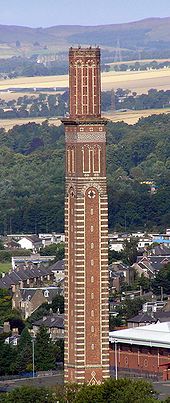 Cox's Stack, a chimney from the former Camperdown works jute mill. The chimney takes its name from jute baron James Cox who later became Lord Provost of the city
Cox's Stack, a chimney from the former Camperdown works jute mill. The chimney takes its name from jute baron James Cox who later became Lord Provost of the city
The period following World War II was notable for the transformation of the city's economy. While jute still employed one-fifth of the working population, new industries were attracted and encouraged. NCR Corporation selected Dundee as the base of operations for the UK in late 1945,[77] primarily because of the lack of damage the city had sustained in the war, good transport links and high productivity from long hours of sunshine. Production started in the year before the official opening of the plant on 11 June 1947. A fortnight after the 10th anniversary of the plant (known locally amongst Dundonians as "The Cash"), the 250,000th cash machine was produced. By the 1960s, NCR had become the principal employer of the city producing cash registers, and later ATMs, at several of its Dundee plants. The firm, developed magnetic-strip readers for cash registers and produced early computers.[78] Astral, a Dundee-based firm that manufactured and sold refrigerators and spin dryers was merged into Morphy Richards and rapidly expanded to employ over 1,000 people. The development in Dundee of a Michelin tyre-production facility helped to absorb the unemployment caused by the decline of the jute industry, particularly with the abolition of the jute control by the Board of Trade on 30 April 1969.[79]
Employment in Dundee changed dramatically during the 1980s with the loss of nearly 10,000 manufacturing jobs due to closure of the shipyards, cessation of carpet manufacturing and the disappearance of the jute trade. To combat growing unemployment and declining economic conditions, Dundee was declared an Enterprise Zone in January 1984. In 1983, the first Sinclair ZX Spectrum home computers were produced in Dundee by Timex. In the same year the company broke production records, despite a sit-in by workers protesting job cuts and plans to demolish one of the factory buildings to make way for a supermarket. Timex closed its Dundee plant in 1993 following an acrimonious six month industrial dispute.[80]
Modern day
Dundee is a regional employment and education centre, with over 300,000 persons within 30 minutes drive of the city centre and around 630,000 people within one hour. Many people from North East Fife, Angus and Perth and Kinross commute to the city.[81] In 2009, there were 30 employers who employed 300 or more staff.[81] The largest employers in the city are NHS Tayside, Dundee City Council, University of Dundee, Tesco, D. C. Thomson & Co and BT.[81] Other employers include limited and private companies such as NCR Corporation, Michelin, SiTel, Alliance Trust, Norwich Union, Royal Bank of Scotland, Asda, Strathtay Scottish, Tayside Contracts, Tokheim, Scottish Citylink, W H Brown Construction, C J Lang & Son, Joinery and Timber Creations, HBOS, Debenhams, Travel Dundee, WL Gore and Associates. The only sectors to see job increases between 2005 and 2009 were in education and human health and social work activities, while manufacturing and administration and support service activities both saw a significant decline.[81] Average weekly earnings of full-time employers in Dundee in May 2010 was £482.80; men received £507.40 and women £418.80.[81] Average earnings in Dundee have increased from £325.00 in 2000 to £482.80 in 2010.[81]
The biomedical and biotechnology sectors, including start-up biomedical companies arising from university research, employ just under 1,000 people directly and nearly 2,000 indirectly. Information technology and Video Game Industry have been important industries in the city for more than 20 years. Rockstar North, developer of Lemmings and the Grand Theft Auto series was founded in Dundee as DMA Design by David Jones; an undergraduate of the University of Abertay Dundee.[82] Other game developing companies in Dundee include Denki, Ruffian Games, Dynamo Games, 4J Studios, Cohort Studios amongst others.
Dundee is also a key retail destination for North East Scotland and has been ranked 4th in Retail Rankings in Scotland.[83] The city centre offers a wide variety of retailers, department stores and independent/specialist stores. The Murraygate and High Street forms the main pedestrian area and is home to a number of main anchors such as Marks and Spencer, Monsoon, Accessorize and Zara.[83] The main pedestrian area also connects the two large shopping centres; the 420,000 sq ft (39,000 m2) Overgate Centre which is anchored by Debenhams, H&M, Next and Primark and the 310,000 sq ft (29,000 m2) Wellgate Centre by BHS, T.J. Hughes and Peacocks.[83]
Landmarks
Gardyne's Land at 70–73 High Street is a complex of five buildings: a L-plan three-storey merchant's house from around 1560; lodgings from around 1640; a tenement from around 1790; billiard hall from around 1820 and a Victorian retail unit from around 1845.[84] The merchant's house is the only domestic building surviving from the time, when Dundee was Scotland's second largest city. All of the buildings are Category A listed buildings.[85] The buildings came to the attention of the Tayside Building Preservation Trust in 1995, a limited company with charitable status which exists to restore and reuse buildings of architectural or historic interest at risk in Tayside.[86] Between 1997 and 2000, the buildings were acquired by the trust and funds were raised for the project. A first phase of wind and waterproof works commenced in 2000. Between 2000 and 2003, a professional team were appointed and plans were first drawn up and approved for conversion into hostel use.[86] In April 2005, the project was handed over to Dundee City Council. The restoration of Gardyne's Land has received awards from the Dundee Civic Trust, Dundee Institute of Architects, the Royal Town planning institute, a Scottish award for quality in planning and regeneration and renewal magazine.[86]
Transport
Dundee is served by the A90 road which connects the city to the M90 and Perth in the west, and Forfar and Aberdeen in the north. The part of the road that is in the city is a dual carriageway and forms the city's main bypass on its north side, known as the Kingsway. East of the A90's Forfar Road junction, the Kingsway East continues as the A972, and meets the A92 at the Scott Fyffe roundabout. Travelling east, the A92 connects the city to Arbroath and Montrose and to the south with Fife via the Tay Road Bridge.
The A930 links the city with coastal settlements to the east, including Broughty Ferry, Monifieth and Carnoustie. Progressing westward from where the A92 meets the Tay Road Bridge at the Riverside Roundabout, the A85 follows the southern boundary of the city along Riverside Drive and towards the A90 at the Swallow Roundabout. The A85 multiplexes with the A90 and diverges again at Perth.
Also meeting the A92 and A85 at the Riverside Roundabout is the A991 Inner Ring Road, which surrounds the perimeter of the city centre, returning to the A92 on the east side of the Tay Road Bridge. The A923 Dundee to Dunkeld road meets the A991 at the Dudhope Roundabout, and the A929 links the A991 to the A90 via Forfar Road.
Dundee has an extensive public bus transport system, with the Seagate bus station serving as the city's main terminus for journeys out of town. National Express Dundee operates most of the intra-city services, with other more rural services operated by Stagecoach Strathtay. The city's two railway stations are the main Dundee (Tay Bridge) Station, which is situated near the waterfront and the much smaller Broughty Ferry Station, which is located to the eastern end of the city. These are complemented by the stations at Invergowrie, Balmossie and Monifieth. Passenger services at Dundee are provided by First ScotRail, CrossCountry and East Coast. There are no freight services that serve the city since the Freightliner terminal in Dundee was closed in the 1980s.
There are also many intercity bus services offered by Megabus, Citylink and National Express.
Dundee Airport offers commercial flights to London City Airport, Birmingham International Airport and Belfast City.[87] The airport is capable of serving small aircraft and is located 3 kilometres west of the city centre, adjacent to the River Tay. The nearest major international airport is Edinburgh Airport, 59.2 miles (95.3 km) to the south.
The nearest international passenger seaport is Newcastle.
Education
Schools
Schools in Dundee have a pupil enrolment of over 20,300. There are 37 primary state schools and nine secondary state schools in the city. Of these, 11 primary and two secondary schools serve the city's Catholic population; the remainder are non-denominational.[88] There is also one specialist school that caters for pupils with learning difficulties aged between five and 18 from Dundee and the surrounding area.[89]
Dundee is home to one independent school, the High School of Dundee, which was founded in the 13th century by the Abbot and monks of Lindores Abbey.[90] The current building was designed by George Angus in a Greek Revival style and built in 1832-34.[91] Early students included Thomas Thomson and Hector Boece,[92] as well as the brothers James, John and Robert Wedderburn who were the authors of The Gude and Godlie Ballatis, used early in the Scottish Reformation as a vehicle to spread Protestant theology.[93] It was the earliest reformed school in Scotland, having adopted the new religion in 1554.[citation needed] According to Blind Harry's largely apocryphal work The Actes and Deidis of the Illustre and Vallyeant Campioun Schir William Wallace, William Wallace was also educated in Dundee.
Colleges and universities
Dundee is home to two universities and a student population of approximately 17,000.[2]
The University of Dundee became an independent entity in 1967, after 70 years of being incorporated into the University of St Andrews during which time it was known initially as University College and latterly as Queen's College. Significant research in biomedical fields and oncology is carried out in the "College of Life Sciences".[94] The university also incorporates the Duncan of Jordanstone School of Art and Design and the teacher training college.
The University of Abertay Dundee was founded as Dundee Institute of Technology in 1888. It was granted university status in 1994 under the Further and Higher Education Act, 1992. The university is noted for its computing and creative technology courses, particularly in computer games technology.[95]
Dundee College is the city's umbrella further education college, which was established in 1985 as an institution of higher education and vocational training.
The Al-Maktoum Institute was established in Dundee in Blackness Road in 2001. It is a research-led institution of higher education which offers postgraduate programmes of study (taught Masters and MPhil/PhD research) in the study of Islam and multiculturalism. It is an independent institution, with its degree programmes validated by the University of Aberdeen. It is named after its patron, Hamdan bin Rashid Al Maktoum.[96]
Religious sites
Christian groups
The Church of Scotland Presbytery of Dundee is responsible for overseeing the worship of 37 congregations in and around the Dundee area, 21 of which are in the city itself, with a further five in Broughty Ferry and Barnhill, although changing population patterns have led to some of the churches becoming linked charges.[97] Due to their city centre location, the City Churches, Dundee Parish Church (St Mary's) and the Steeple Church, are the most prominent Church of Scotland buildings in Dundee. They are on the site of the medieval parish kirk of St Mary, of which only the 15th century west tower survives. The attached church was once the largest parish church in medieval Scotland.[98] Dundee was unusual among Scottish medieval burghs in having two parish kirks; the second, dedicated to St Clement, has disappeared, but its site was approximately that of the present City Square.[citation needed]
In the Middle Ages Dundee was also the site of houses of the Dominicans (Blackfriars), and Franciscans (Greyfriars), and had a number of hospitals and chapels. These establishments were sacked during the Scottish Reformation, in the mid-16th century, and were reduced to burial grounds, now Barrack Street and The Howff burial ground respectively.[99]
St. Paul's Cathedral is the seat of the Scottish Episcopal Diocese of Brechin. It is charged with overseeing the worship of 8 congregations in the city (9, including Broughty Ferry), as well as a further 17 in Angus, the Carse of Gowrie and parts of Aberdeenshire. The diocese was led by Bishop John Mantle until October 2010 when Bishop Mantle retired. The Diocese will be electing a new bishop in the Spring of 2011.[100] St. Andrew's Cathedral is the seat of the Roman Catholic Diocese of Dunkeld, led by Bishop Vincent Paul Logan. The diocese is responsible for overseeing 15 congregations in Dundee and 37 in the surrounding area.[101]
There are Methodist,[102] Baptist,[103] Congregationalist, Pentacostalist[104] and Salvation Army[105] churches in the city, and non-mainstream Christian groups are also well represented, including the Unitarians,[106] the Society of Friends,[107] the Jehovah's Witnesses,[108] Christadelphians,[109] and Church of Jesus Christ of Latter-day Saints.[110]
Non-Christian groups
Muslims are served by the Dundee Islamic Society Central Mosque in Brown Street built in 2000 to replace their former premises in Hilltown.[111] There are also smaller mosques at Victoria Road and Dura Street.[112]
A recorded Jewish community has existed in the city since the early 19th century.[113] There is a small Orthodox synagogue at Dudhope Park[114] that was built in the 1960s,[115] with the Hebrew Burial Grounds located three miles (5 km) to the east.[116] Samye Dzong Dundee is a Buddhist Temple based in Reform Street.[117] There is also a Hindu mandir and Sikh gurdwara that share a premises in Taylor's Lane situated in the West End of the city, and there is a second gurdwara in Victoria Road.[118]
Culture
Dundee is home to Scotland's only full-time repertory ensemble, established in the 1930s. One of its alumni, Hollywood actor Brian Cox is a native of the city.[119] The Dundee Repertory Theatre, built in 1982 is the base for Scottish Dance Theatre.
Dundee's principal concert auditorium, the Caird Hall (named after its benefactor, the jute baron James Key Caird) in the City Square regularly hosts the Royal Scottish National Orchestra.[120] Various smaller venues host local and international musicians during Dundee's annual Jazz, Guitar and Blues Festivals. The Dundee Contemporary Arts, which opened in 1999 in the city's cultural quarter, is home to both an art gallery and art house cinema.[121]
The city's main museum and art gallery, McManus Galleries is in Albert Square.[122] The exhibits include a collection of fine and decorative art, items from Dundee's history and natural history artefacts. Britain's only full-time public observatory, Mills Observatory at the summit of the city's Balgay Hill was gifted to the city by linen manufacturer and keen amateur scientist, john mills in 1935.[123] Sensation Science Centre in the Greenmarket is a science centre based on the five senses through a series of interactive shows and exhibits.[124] Verdant Works is a museum dedicated to the once dominant jute industry in Dundee and is based in a former jute mill.[125] A new £47 million pound centre for art and design known as the "V&A at Dundee" is to be built south of Craig Harbour onto the River Tay for completion in 2014. The new museum may bring another 500,000 extra visitors to the city and create up to 900 jobs for the area.[126]
The city's archives and records are mostly kept by two archives, Dundee City Archives, which are operated by Dundee City Council and the University of Dundee's Archive Services. Dundee City Archives holds the official records of the city and of the former Tayside Regional Council.[127] the archive also holds the records of various people groups and organizations connected to the city. The Univerity's Archive Services hold a wide range of material relating to the University and its predecessor institutions and to individuals associated with the University such as D'Arcy Wentworth Thompson. Archive Services is also home to athe archives of several individuals, businesses and organizations based in Dundee and the surrounding area.[128] The records held include a substantial number of business archives relating to the jute and linen industry in Dundee, records of other businesses including the archives of the Alliance Trust and the department store G. L. Wilson, the records of the Brechin Diocese of the Scottish Episcopal Church and the NHS Tayside Archive.[129][130] The same archive also holds the Michael Peto collection which includes thousands of the famed photojournalist's photographs, negatives, slides, publications and papers.[131]
Dundee is home to DC Thomson & Son Ltd established in 1905, which produces over 200 million magazines, newspapers and comics every year, which include The Beano, The Dandy and the The Press and Journal.[83] Dundee has a strong literary heritage, with several authors having been born, lived or studied in the city. These include A. L. Kennedy, Rosamunde Pilcher, Kate Atkinson, Thomas Dick, Mary Shelley, Mick McCluskey, John Burnside and Neil Forsyth. The Dundee International Book Prize is a biennial competition open to new authors, offering a prize of £10,000 and publication by Polygon Books. Past winners have included Andrew Murray Scott, Claire-Marie Watson and Malcolm Archibald. William McGonagall, regularly cited as the "world's worst poet",[132] worked and wrote in the city, often giving performances of his work in pubs and bars. Many of his poems are about the city and events therein, such as his work The Tay Bridge Disaster. City of Recovery Press was founded in Dundee, and has become a controversial figure in documenting the darker side of the city.[133]
Cinema
The Dundee Mountain Film Festival (DMFF), held in the last weekend of November, presents the best presenters and films of the year in mountaineering, mountain culture and adventure sport, along with an art and trade exhibition.[134] DMFF is also one of the members of International Alliance for Mountain Film (IAMF)[135] among other important international Mountain film festivals. The animator, Jimmy MacDonald, the voice of Mickey Mouse from 1946 until the early 1980s, was born in the city in 1906.[136]
Music
Popular music groups such as the 1970s soul-funk outfit Average White Band, the Associates, the band Spare Snare, Danny Wilson and the Indie rock bands The View and The Law are from Dundee.Ricky Ross of Deacon Blue and singer-songwriter KT Tunstall are former pupils of the High School of Dundee, although Tunstall is not a native of the city.[137] The Northern Irish indie rock band Snow Patrol was formed by students at the University of Dundee,[138] Brian Molko, lead singer of Placebo, grew up in the city.[139] At the end of June, Dundee hosts an annual blues festival known as the Dundee Blues Bonanza.[140]
Television and radio
Dundee is home to one of 11 BBC Scotland broadcasting centres, located within the Nethergate Centre.[141] STV North's Tayside news and advertising operations are based in the Seabraes area of the city, from where an STV News Tayside opt-out bulletin is broadcast, (though not on Digital Satellite), within the nightly regional news programme, STV News at Six. The city also has a community internet TV station called The Dundee Channel which was launched on 1 September 2009.
The city has three local radio stations. Radio Tay was launched on 17 October 1980.[142] The station split frequencies in January 1995 launching Tay FM for a younger audience and Tay AM playing classic hits. In 1999, Discovery 102 was launched, later to be renamed Wave 102.
The University of Dundee has also launched its student radio (internet based) which can be streamed online at www.discoverradio.org. Housed in the Dundee University Students Association building, the station has been broadcasting since September 2010 and includes live shows, music and chat about the city and university life.
Sports and Recreation
Dundee has two professional football teams; Dundee and Dundee United who play at Dens Park and Tannadice Park, respectively.[143][144] Their stadiums are closer together than any senior football club pair in the UK.[145] Dundee is one of only three British cities to have produced two European Cup semi-finalists.[citation needed] Dundee lost to A.C. Milan in 1963 [146] and Dundee United lost to A.S. Roma in 1984.[147] Dundee also reached the semi-finals of the forerunner to the UEFA Cup in 1968 and Dundee United were runners-up in the UEFA Cup in 1987.[148] There are also seven junior football teams in the area: Dundee North End, East Craigie, Lochee Harp, Lochee United, Dundee Violet, Broughty Athletic and Downfield.[149]
The city is also home to five rugby union teams – Dundee High School Former Pupils rugby club who play in the RBS Premiership Division One;[150] Morgan Academy Former Pupils in the RBS Premiership Division Three;[151] Harris Academy Former Pupils in the RBS Caledonian Division Two Midlands[152] and Panmure R.F.C. and Stobswell R.F.C. both in the RBS Caledonian Division Three Midlands.[153]
Dundee Stars, the main ice hockey team, play at the Dundee Ice Arena. The team joined the Elite League in the 2010/2011 season.[154] Other sports clubs operating in the city include Menzieshill Hockey Club; Dundee Northern Lights floorball club, Dundee Hawkhill Harriers, Dundee City Aquatics and Dundee Radio Controlled Car Club.
A new £24 million Olympia leisure centre with multi-storey car park which will replace the exiting facility, construction has begun and is progressing very well, the structure is complete and is scheduled for a completion date in early 2012.[155]
Public services
Dundee and the surrounding area is supplied with water by Scottish Water. Dundee, along with parts of Perthshire and Angus is supplied from Lintrathen and Backwater reservoirs in Glen Isla.[156] Electricity distribution is by Scottish Hydro Electric plc, part of the Scottish and Southern Energy group.
Waste management is handled by Dundee City Council. There is a kerbside recycling scheme that currently only serves 15,500 households in Dundee. Cans, glass and plastic bottles are collected on a weekly basis.[157] Compostable material and non-recyclable material are collected on alternate weeks.[158] Paper is collected for recycling on a four-weekly basis.[159]
Recycling centres and points are at a number of locations in Dundee.[160] Items accepted include, steel and aluminium cans, cardboard, paper, electrical equipment, engine oil, fridges and freezers, garden waste, gas bottles, glass, liquid food and drinks cartons, plastic bottles, plastic carrier bags, rubble, scrap metal, shoes and handbags, spectacles, textiles, tin foil, wood and yellow pages. According to recent figures taken in 2008, suggest the city council has a recycling rate of 36.1%.[161]
Law enforcement is provided by Tayside Police. The headquarters of Tayside Police are in West Bell Street.[162] There are also four police stations which serve the city: Maryfield, Lochee, Downfield and Longhaugh.[162]
Healthcare is supplied in the area by NHS Tayside. Ninewells Hospital, is the only hospital with an accident and emergency department in the area. Primary Health Care in Dundee is supplied by a number of General Practices.[citation needed] Dundee is also served by the East Central Region of the Scottish Ambulance Service which covers the city, Tayside and Kingdom of Fife.[163] There are two ambulance stations for the city; one on West School Road and the other at Ninewells Hospital.[164]
Twin cities
Dundee maintains cultural, economic and educational ties with six twin cities:[165]
- Orléans, France (1946)
- Zadar, Croatia (1959)
- Würzburg, Bavaria, Germany (1962)
- Alexandria, Virginia, United States (1974)
- Nablus, Palestinian territories (1980)
- Dubai, United Arab Emirates
In addition, the Scottish Episcopalian Diocese of Brechin (centred on St Paul's Cathedral in Dundee) is twinned with the diocese of Iowa, United States and the diocese of Swaziland.[166]
See also
- Brittle Bone Society, a UK charity established in 1968 in Dundee
- Alexander C. Lamb and references to the Lamb Collection which is held in the City Museum and the Local History Centre of Dundee Central Library.
Notes
- ^ "''Ainmean-Àite na h-Alba ~ Gaelic Place-names of Scotland''". Gaelicplacenames.org. http://www.gaelicplacenames.org/databasedetails.php?id=511. Retrieved 25 August 2011.
- ^ a b c Population Matters
- ^ a b Mid-2008 Population Estimates
- ^ Watson 1926, p. 220; Dundee is also recorded as Dun-Tay, eg. Pont c1583-96
- ^ The earliest evidence for human occupation of the area dates as far back as the Mesolithic: Mathewson 1879; RCAHMS Canmore database: Dundee, Stannergate
- ^ Barrow 2003, p. 266
- ^ Barrow 1990, pp. 20–21; Turnock 1982, p. 23; Mackie 1836, pp. 23–24
- ^ a b Barrow 1990, p. 24
- ^ Barrow 1965, p. 272; p. 374
- ^ Mackie 1836, pp. 30–32; pp. 207–208
- ^ McKean 2009, pp. 9–10; Merriman 2000 pp. 263, 292, 304, 360–361
- ^ Lythe 1958, pp. 27–28; Reid 1990, pp. 97–99; Cowan 1995, pp. 195–198; Cullen, Whatley & Young 2009, pp. 61–63
- ^ Mackie 1836, pp. 32–38; Lythe 1958, pp. 28–30; Cullen, Whatley & Young 2009, pp. 63–64
- ^ Lenman 1980, p. 30; Patrick 2009, pp. 85–88
- ^ Whatley, Swinfen & Smith 1993, pp. 28–30
- ^ McKean, Swan & Archibald 2009, p. 274; Whatley 1992, p. 23; Checkland & Checkland 1989, p. 45; Durie 1979 p. 27; p. 52; pp. 146–147;
- ^ McKean, Swan & Archibald 2009, p. 275
- ^ a b Smout 1998, pp. 240–248
- ^ Durie 1979, p. 169
- ^ Turnock 1982, p. 60; p. 122; Watson 1990, p. 14; Watson 2004, p. 94
- ^ Lenman, Lythe & Gauldie 1969, pp. 23–24; Stewart 1998, p. 1; Checkland & Checkland 1989, p. 48
- ^ Swift & Gilley 1989, pp. 117–118; Dundee Heritage Trust 1998, pp. 1–3
- ^ Jackson & Kinnear 1990, pp. 16–22
- ^ McCarthy 2007, p. 80; Kenefick 2000, pp. 38–50
- ^ Huntford 1986, p. 47
- ^ Hunting the Whale: The Whale Ships
- ^ Mathew 1998, p. 12
- ^ Neuburg 1983, p. 75
- ^ Lewis 2004, p. 69
- ^ Roul 2009, p. 103; Stewart 1998, pp. 16–17; Stewart 2011, p. 37
- ^ Whatley 1990, p. 45; Devine, Lee & Peden 2005, p. 166
- ^ Devine, Lee & Peden 2005, p. 169; Cortada 1993, p. 237; Knox & McKinlay 2011, p. 266
- ^ a b McKean 2011, p. 100; Dundee Waterfront Brochure; Dundee Central Waterfront Masterplan 2001-2031
- ^ Chronicle of The City's Office Bearers, Chambers, Regalia, Castles & Twin Cities; the apocryphal toponym Dei Donum was applied by Hector Boece in the sixteenth century: Ferguson 1998, pp. 60–61
- ^ a b Local Government etc. (Scotland) Act 1994
- ^ Councils plot revolt over re-draw plan 2005
- ^ a b Dundee House
- ^ Dundee City Council Political Make-up
- ^ Dundee Tory leader hits out at critic 2005
- ^ Local Governance (Scotland) Act 2004
- ^ Councillors - Political Wards - by Councillor Surname
- ^ a b Fifth Periodical Review of Constituencies
- ^ Stewart Hosie, MP for Dundee East
- ^ James McGovern, MP for Dundee West
- ^ Shona Robison, MSP for Dundee East
- ^ Joe Fitzpatrick, MSP for Dundee West
- ^ Graeme Dey, MSP for Angus South
- ^ a b List of MEPs in Scotland
- ^ a b UK Postcode to Postcode Calculator
- ^ a b c d Ordnance Survey Landranger Map 2007
- ^ Population density: Scotland: by unitary authority
- ^ a b c Bluck 2000, p. 422; GeoIndex Onshore
- ^ Soil Survey of Scotland 1982
- ^ Merriman 2000, pp. 360–361
- ^ McCarthy 2007, p. 80; The progress of waterfront development can be seen in the maps of Wood 1821, Edward 1846 and Bartholomew 1912
- ^ Lenman, Lythe & Gauldie 1969, p. 9; Royal Commission on the Ancient and Historical Monuments of Scotland 1992 p. 25; Watson 1990, p. 8
- ^ Walker 1968, p. 296
- ^ Royal Commission on the Ancient and Historical Monuments of Scotland 1992 p. 26
- ^ McKean 2011, pp. 72–76
- ^ Logie Conservation Area; Royal Commission on the Ancient and Historical Monuments of Scotland 1992 pp. 51–52; McKean 2011, p. 81
- ^ McKean 1990, p. 73; McKean 2011, p. 85
- ^ McKean 1990, p. 73; McKean 2011, p. 93
- ^ Walker 1968, p. 296; Royal Commission on the Ancient and Historical Monuments of Scotland 1992 p. 55
- ^ Walker 1968, p. 296; McKean 1990, p. 73; Scott 2002 pp. 73–76; pp. 103–106; Glendinning 1997, pp. 25, 56
- ^ Tenants gone, soon multi too; Last of Menzieshill multis to be brought down this week; Four Dundee Hilltown multi-storey blocks to come down; Fate of Whitfield's Skarne blocks to be decided
- ^ Peel, Finlayson & McMahon 2007
- ^ Regional mapped climate averages
- ^ Aug 1995 Maximum
- ^ Jul 2006 Mean
- ^ 1971-2000 average warmest day
- ^ 1971-2000 >25c days
- ^ "Climate Normals and extremes". Royal Netherlands Meteorological Institute. http://eca.knmi.nl/utils/mapserver/climatology.php?indexcat=**&indexid=SU&periodidselect=1971-2000&seasonid=0&scalelogidselect=no&minx=-642500.000002&miny=-4174880.952380&maxx=224166.666666&maxy=-3524880.952379&MapSize=560%2C420&imagewidth=560&imageheight=420&mainmap.x=280&mainmap.y=207&CMD=QUERY_POINT&CMD=QUERY_POINT#bottom. Retrieved 21 Mar 2011.
- ^ a b c d Comparative Population: Dundee
- ^ Comparative Employment: Dundee
- ^ McCluskey 1991; Dundee Scots
- ^ Swift & Gilley 1989, p. 117; Little Tipperary: The Irish in Lochee
- ^ NCR Cash Advance
- ^ First Dundee computer next year
- ^ General Agreements on Tariffs and Trade 1969
- ^ Timex pulls the plug on Dundee plant; Scott 2002, pp. 163–165
- ^ a b c d e f Dundee Economic Profile
- ^ The Complete History of DMA Design
- ^ a b c d Discover Dundee Retail
- ^ McKean & Walker 1985, p. 18; Dragging a building into the 21st Century; Gardyne's Land wins multiple awards
- ^ Dragging a building into the 21st Century
- ^ a b c Gardyne's Land wins multiple awards
- ^ Dundee Airport
- ^ Primary Schools; Secondary Schools
- ^ Kingspark School
- ^ Strong 1909, p. 19
- ^ Colvin 2008, p. xx
- ^ Kerr 1913, p. 13
- ^ Dawson 2007, p. 159
- ^ College of Life Sciences
- ^ money for computer games centre
- ^ Al-Maktoum Institute
- ^ Presbytery of Dundee
- ^ McKean 2009, p. 5
- ^ Mackie 1836, p. 120; Foggie 2003, p. 35
- ^ The Diocese of Brechin
- ^ The Diocese of Dunkeld
- ^ Dundee Methodist Church
- ^ Trinity Baptist Church
- ^ Assemblies of God Scotland
- ^ Salvation Army Dundee; Salvation Army Menzieshill
- ^ Williamson Unitarian Christian Church Dundee
- ^ Dundee Quaker Meeting
- ^ Jehovah's Witnesses - Dundee
- ^ Dundee Christadelphian Ecclesia
- ^ Church of Jesus Christ of Latter-day Saints
- ^ Dundee Islamic Society Central Mosque
- ^ UK Mosque Searcher: Mosques in Dundee
- ^ Abrams 2009, pp. 65–94
- ^ Dundee Hebrew Congregation
- ^ Scotland's Jewish Community
- ^ International Jewish Cemetery Project — Scotland
- ^ Kagyu Samye Dzong Dundee (Rokpa Dundee)
- ^ Hindu Council UK; Gurudwaras in Scotland
- ^ Cox may be ambassador for Dundee
- ^ Day & Milne 2010, p. 78
- ^ Jarron 2011, p. 183
- ^ Day & Milne 2010, p. 30
- ^ Day & Milne 2010, p. 47
- ^ Day & Milne 2010, p. 20
- ^ Gale & Kaur (2002) p187; Dundee Heritage Trust (1998) pp1-3
- ^ Dundee to get its own V&A museum
- ^ "Archives". Dundee City Council. http://www.dundeecity.gov.uk/archive/. Retrieved 17 November 2011.
- ^ "University of Dundee Archives Services". University of Dundee. http://www.dundee.ac.uk/archives. Retrieved 2 June 2011.
- ^ "University of Dundee Archives Services the Collections". University of Dundee. http://www.dundee.ac.uk/archives/archman.htm. Retrieved 2 June 2011.
- ^ "Business Archives". Archives, Records and Artefacts at the University of Dundee. http://www.archives-records-artefacts.com/2011/01/business-archives.html. Retrieved 9 June 2011.
- ^ "Michael Peto Photographic Collection", University of Dundee. Retrieved 26 May 2011.
- ^ McGonagall 1992
- ^ www.cityofrecovery.com
- ^ Dundee Mountain Film Festival
- ^ International Alliance for Mountain Film
- ^ Jimmy MacDonald
- ^ Almost Famous
- ^ Snow Patrol
- ^ NME Interview with Placebo
- ^ Dundee Blues Bonanza
- ^ Contact numbers for BBC Scotland
- ^ Radio Tay's first day
- ^ Dundee United
- ^ Dundee
- ^ Tannadice Park
- ^ European Cup History, Season 1962–1963
- ^ European Cup History, Season 1983–1984
- ^ UEFA Cup History, Season 1986–1987
- ^ Scottish Junior Football Clubs A–K
- ^ Dundee HSFP
- ^ Morgan Academy
- ^ Harris Academy
- ^ Panmure and Stobswell
- ^ Dundee Stars join Elite
- ^ new Olympia leisure centre
- ^ Scrimgeour 1968, pp. 278–283
- ^ Kerbside Recycling Box Scheme
- ^ Brown Bin Garden Waste Collection
- ^ Blue Bin Paper Collections
- ^ Recycling Centres; Recycling Points
- ^ Waste Aware Tayside
- ^ a b Policing in Dundee
- ^ Scottish Ambulance Service
- ^ Ambulance Stations in Scotland
- ^ Chronicle of The City's Office Bearers, Chambers, Regalia, Castles & Twin Cities; City promotes Emirates connection
- ^ Brechin-Iowa-Swaziland: Walking together in companionship
References
News
- "Dundee Tory leader hits out at critic", Evening Telegraph, 28 February 2005, http://www.eveningtelegraph.co.uk/output/2005/02/28/story6861222t0.shtm, retrieved 3 May 2011
- Didcock, Barry (1 May 2005). "Almost Famous". Sunday Herald. Archived from the original on 27 April 2006. http://web.archive.org/web/20060427090846/http://www.sundayherald.com/49411. Retrieved 6 September 2006.
- "City promotes Emirates connection". BBC News. 21 July 2009. http://news.bbc.co.uk/1/hi/scotland/tayside_and_central/8160624.stm. Retrieved 5 May 2011.
- "Dundee Stars join top UK league". BBC Sport. 28 April 2010. http://news.bbc.co.uk/sport1/hi/other_sports/ice_hockey/8649518.stm. Retrieved 7 August 2011.
- "Dragging a building into the 21st Century", Scottish Planner: p. 11, July, 2010
- Macmahon, Peter (19 February 2005), "Councils plot revolt over re-draw plan", The Scotsman (Edinburgh), http://news.scotsman.com/politicalboundaryreview/Councils-plot-revolt-over-redraw.2603731.jp, retrieved 3 May 2011
- "Time running out for 'least liked' building Tayside House", The Courier, 17 August 2011, http://www.thecourier.co.uk/News/Dundee/article/16542/time-running-out-for-least-liked-building-tayside-house.html, retrieved 18 August 2011
- "Fate of Whitfield's Skarne blocks to be decided". The Courier. 4 May 2011. http://www.thecourier.co.uk/News/Dundee/article/13586/fate-of-whitfield-s-skarne-blocks-to-be-decided.html. Retrieved 16 May 2011.
- "First Dundee computer next year". The Courier. 7 December 1966.
- "Four Dundee Hilltown multi-storey blocks to come down". The Courier. 14 September 2010. http://www.thecourier.co.uk/News/Dundee/article/5074/four-dundee-hilltown-multi-storey-blocks-to-come-down.html. Retrieved 16 May 2011.
- "Gardyne's Land wins multiple awards". University of Dundee. 2009. http://www.dundee.ac.uk/planning/events/gardynes.htm. Retrieved 4 May 2011.
- "Last of Menzieshill multis to be brought down this week". The Courier. 5 March 2011. http://www.thecourier.co.uk/News/Dundee/article/11557/last-of-menzieshill-multis-to-be-brought-down-this-week.html. Retrieved 16 May 2011.
- "Tenants gone, soon multi too". Evening Telegraph. 2 March 2007. http://www.eveningtelegraph.co.uk/output/2007/03/04/story9373804t0.shtm. Retrieved 16 May 2011.
- "Timex pulls the plug on Dundee plant". The Scotsman. 29 August 1993. Archived from the original on 14 June 2006. http://web.archive.org/web/20060614134707/http://heritage.scotsman.com/videos.cfm?vid=57. Retrieved 8 July 2006.
Websites
- A Chronicle of The City's Office Bearers, Chambers, Regalia, Castles & Twin Cities, Dundee City Council, http://www.dundeecity.gov.uk/dundeecity/uploaded_publications/publication_69.pdf, retrieved 25 April 2011
- "Al-Maktoum Institute". http://www.almi.abdn.ac.uk. Retrieved 5 May 2011.
- "A list of ambulance stations in Scotland". isdscotland. 2005. http://www.isdscotland.org/isd/files/Notif0805B.htm. Retrieved 21 March 2011.
- "Assemblies of God Scotland". www.aogscotland.org.uk. http://www.aogscotland.org.uk/ChurchDirectory.htm#EastCoast. Retrieved 30 January 2009.
- "Blue Bin Paper Collections". dundeecity.gov.uk. http://www.dundeecity.gov.uk/wasteman/bluebin/. Retrieved 11 March 2009.
- "Brechin-Iowa-Swaziland: Walking together in companionship". Episcopal Life Online. http://www.episcopalchurch.org/81799_92921_ENG_HTM.htm. Retrieved 26 February 2009.
- "Brown Bin Garden Waste Collection". dundeecity.gov.uk. http://www.dundeecity.gov.uk/wasteman/brownbin/. Retrieved 11 March 2009.
- "The Church of Jesus Christ of Latter-day Saints search". www.lds.org.uk. http://www.lds.org.uk/contact-us/ward-locator/search-by-map/details/dundee-bingham-ward/. Retrieved 20 April 2011.
- "College of Life Sciences Research Biocentre". University of Dundee. http://www.dundee.ac.uk/biocentre/. Retrieved 26 May 2011.
- "Comparative Employment: Dundee Locality Scotland". Scotland's Census Results Online. 2001. http://www.scrol.gov.uk/scrol/browser/profile.jsp?profile=Employment&mainLevel=Locality&mainText=Dundee&mainTextExplicitMatch=false&compLevel=CountryProfile&compText=&compTextExplicitMatch=null. Retrieved 18 April 2011.
- "Comparative Population: Dundee Locality Scotland". Scotland's Census Results Online. 2001. http://www.scrol.gov.uk/scrol/browser/profile.jsp?profile=Population&mainLevel=Locality&mainText=Dundee&mainTextExplicitMatch=false&compLevel=CountryProfile&compText=&compTextExplicitMatch=null. Retrieved 18 April 2011.
- "Contact numbers for BBC Scotland". BBC News. http://www.bbc.co.uk/scotland/aboutus/ciac/information/contact.shtml. Retrieved 2 March 2009.
- "Councillors - Political Wards - by Councillor Surname". Dundee City Council. http://www.dundeecity.gov.uk/councillors/wardsbysurname/. Retrieved 24 April 2011.
- "Cox may be ambassador for Dundee". BBC News. 5 April 2006. http://news.bbc.co.uk/1/hi/scotland/4880844.stm. Retrieved 26 May 2011.
- "The Diocese of Brechin". www.thedioceseofbrechin.org. http://www.thedioceseofbrechin.org. Retrieved 30 January 2009.
- "The Diocese of Dunkeld". www.dunkelddiocese.org.uk. http://www.dunkelddiocese.org.uk/. Retrieved 30 January 2009.
- "Dundee Football Club". www.scottishfootballleague.com. http://www.scottishfootballleague.com/scottish_football.cfm?curpageid=1168. Retrieved 10 March 2009.
- "Dundee Airport". Dundee City Council. 2006. Archived from the original on 11 August 2006. http://web.archive.org/web/20060811190112/http://www.dundeecity.gov.uk/airport/main.htm.
- "Dundee Blues Bonanza". http://www.dundeebluesbonanza.co.uk/. Retrieved 6 September 2006.
- "Dundee Central Waterfront Masterplan 2001-2031". Dundee City Council and Scottish Enterprise. http://www.dundeecity.gov.uk/dundeecity/uploaded_publications/publication_77.pdf. Retrieved 24 April 2011.
- "Dundee Christadelphian Ecclesia". www.searchforhope.org. http://www.searchforhope.org/dundee. Retrieved 26 October 2010.
- "Dundee City Council Political Make-up", Dundee City Council website, http://www.dundeecity.gov.uk/elections/mappage.htm, retrieved 3 May 2011
- "Dundee Economic Profile". January 2011. http://www.dundeecity.gov.uk/dundeecity/uploaded_publications/publication_119.pdf. Retrieved 24 February 2011.
- "Dundee Hebrew Congregation". www.scojec.org. http://www.scojec.org/communities/dundee/index.html. Retrieved 28 January 2009.
- "Dundee HSFP Results and Fixtures". Scottish Rugby. http://www.scottishrugby.org/community/index.php?option=com_joomleague&func=showResultsRank&p=319&Itemid=789. Retrieved 7 August 2011.
- "Dundee Islamic Society Central Mosque". http://www.dundeecentralmosque.org.uk/home.htm. Retrieved 28 January 2009.
- "Dundee Methodist Church". www.dundeemethodist.org.uk.. http://www.dundeemethodist.org.uk. Retrieved 30 January 2009.
- "Dundee Mountain Film Festival". www.dundeemountainfilm.org.uk. http://www.dundeemountainfilm.org.uk/. Retrieved 26 May 2011.
- "Dundee Quaker Meeting". www.quakerscotland.org. http://www.quakerscotland.org/dundee. Retrieved 30 January 2009.
- "Dundee Scots". Wir Ain Leid. http://www.scots-online.org/grammar/dundee.htm. Retrieved 27 April 2011.
- "Dundee's Twins Around the World". Dundee City Council. http://www.dundeecity.gov.uk/supportservs/dundeetwins/. Retrieved 4 July 2006.
- "Dundee United Football Club, Team Profile". Scottish Premier Football League (SPL). http://www.scotprem.com/content/default.asp?page=s10_2. Retrieved 10 March 2009.
- "Dundee Waterfront Brochure". Dundee Waterfront. http://www.dundeewaterfront.com/documents/waterfrontbrochure2_000.pdf. Retrieved 24 April 2011.
- "European Cup History, Season 1962–1963". www.europeancuphistory.com. http://www.europeancuphistory.com/euro63.html. Retrieved 10 March 2009.
- "European Cup History, Season 1983–1984". www.europeancuphistory.com. http://www.europeancuphistory.com/euro84.html. Retrieved 10 March 2009.
- "Fifth Periodical Review of Constituencies", Boundary Commission for Scotland, http://www.bcomm-scotland.gov.uk, retrieved 3 May 2011
- "General Agreements on Tariffs and Trade". Committee of Trade and Development. 12 December 1969. http://www.wto.org/gatt_docs/English/SULPDF/90520090.pdf. Retrieved 17 May 2011.
- "GeoIndex Onshore", British Geological Survey, http://www.bgs.ac.uk/GeoIndex/, retrieved 20 April 2011
- "Graeme Dey, MSP for Angus South". Scottish Parliament. http://www.scottish.parliament.uk/msps/Constituency%202011/con-angs.htm. Retrieved 7 May 2011.
- "Gurudwaras in Scotland". www.allaboutsikhs.com. http://www.allaboutsikhs.com/world-gurudwaras/gurudwaras-in-scotland.html. Retrieved 28 January 2009.
- "Harris Academy Results and Fixtures". Scottish Rugby. http://www.scottishrugby.org/community/index.php?option=com_joomleague&func=showResultsRank&p=304&Itemid=789. Retrieved 7 August 2011.
- "Hindu Council UK". www.hinducounciluk.org. http://www.hinducounciluk.org/newsite/affiliates.asp#Dundee. Retrieved 28 January 2009.
- "Hunting the Whale: The Whale Ships". HistoryShelf.org. East Lothian Council. 2003. http://www.historyshelf.org/secf/whale/08.php. Retrieved 4 May 2011.
- "International Alliance for Mountain Film". http://www.mountainfilmalliance.org/. Retrieved 26 May 2011.
- "International Jewish Cemetery Project — Scotland". http://www.iajgsjewishcemeteryproject.org/scotland/dundee.html. Retrieved 4 May 2011.
- "James McGovern, MP for Dundee West", BBC News, http://news.bbc.co.uk/democracylive/hi/representatives/profiles/38863.stm, retrieved 3 May 2011
- "Jehovah's Witnesses — Angus — Religious Organisations". www.mylocalservices.co.uk. http://www.mylocalservices.co.uk/Angus/Religious_Organisations/1733939/Jehovahs_Witnesses.html. Retrieved 30 January 2009.
- "Jimmy MacDonald (Animator - Voice) Inducted 1933". Walt Disney Company. http://legends.disney.go.com/legends/detail?key=Jimmy+MacDonald. Retrieved 11 June 2011.
- "Joe Fitzpatrick, MSP for Dundee West", The Scottish Parliament, http://www.scottish.parliament.uk/MSP/MembersPages/joe_fitzpatrick/index.htm, retrieved 3 May 2011
- "Kagyu Samye Dzong Dundee (Rokpa Dundee)". dundee.samye.org. http://dundee.samye.org/. Retrieved 28 January 2009.
- "Kerbside Recycling Box Scheme". dundeecity.gov.uk. http://www.dundeecity.gov.uk/wasteman/kerbsiderecycling/. Retrieved 11 March 2009.
- "Kingspark School". kingspark.ea.dundeecity.sch.uk. http://kingspark.ea.dundeecity.sch.uk/. Retrieved 3 February 2009.
- "Little Tipperary: The Irish in Lochee". Legacies. BBC. http://www.bbc.co.uk/legacies/immig_emig/scotland/perth_tayside/article_1.shtml. Retrieved 9 July 2006.
- "List of MEPs in Scotland". European Parliament. http://www.europarl.europa.eu/members/public/geoSearch/search.do?country=GB&zone=Scotland&language=EN. Retrieved 26 May 2011.
- Local Government etc. (Scotland) Act 1994, Office of Public Sector Information, http://www.opsi.gov.uk/acts/acts1994/Ukpga_19940039_en_1.htm, retrieved 3 May 2011
- Local Governance (Scotland) Act 2004, Office of Public Sector Information, http://www.opsi.gov.uk/legislation/scotland/acts2004/20040009.htm, retrieved 3 May 2011
- "Logie Conservation Area". Dundee City Council. http://www.dundeecity.gov.uk/hbenviron/pdfs/logie.pdf. Retrieved 5 May 2011.
- "Mid-2008 Population Estimates – Settlements in order of size". General Register for Scotland. 2008. http://www.gro-scotland.gov.uk/files2/stats/population-estimates/08mye-settlements-table2.pdf. Retrieved 18 April 2011.
- "Money for computer games centre". BBC News. 10 February 2009. http://news.bbc.co.uk/1/hi/scotland/tayside_and_central/7881894.stm. Retrieved 26 May 2011.
- "Morgan Academy Results and Fixtures". Scottish Rugby. http://www.scottishrugby.org/community/index.php?option=com_joomleague&func=showResultsRank&p=336&Itemid=789. Retrieved 7 August 2011.
- "Mansell wins £24 million contract to build major landmark in Dundee". Mansell Construction. http://www.constructingcommunities.com/Home/Media/Publications/10-12-15/Mansell_wins_%c2%a324_million_contract_to_build_major_landmark_in_Dundee.aspx. Retrieved 7 August 2011.
- "NME Interview with Placebo". NME/PlaceboWorld. Archived from the original on 15 April 2006. http://web.archive.org/web/20060415091720/http://www.placeboworld.co.uk/archive/missiveattack.htm. Retrieved 17 July 2006.
- "Panmure RFC and Stobswell RFC Results and Fixtures". Scottish Rugby. http://www.scottishrugby.org/community/index.php?option=com_joomleague&func=showResultsRank&p=305&Itemid=789. Retrieved 7 August 2011.
- "Policing in Dundee". http://www.tayside.police.uk/Your-Community/Dundee. Retrieved 21 March 2011.
- "Population density: Scotland: by unitary authority". Office for National Statistics. 2002. http://www.statistics.gov.uk/STATBASE/ssdataset.asp?vlnk=7657. Retrieved 20 April 2010.
- "Population Matters". Dundee City Council. http://www.dundeecity.gov.uk/dundeecity/uploaded_publications/publication_85.pdf. Retrieved 3 March 2009.
- "Presbytery of Dundee". www.dundeepresbytery.org.uk. http://www.dundeepresbytery.org.uk/index.html. Retrieved 30 January 2009.
- "Primary Schools". www.dundeecity.gov.uk. http://www.dundeecity.gov.uk/education/primaries/. Retrieved 2 March 2009.
- "Radio Tay's first day". retrodundee.blogspot.com. http://retrodundee.blogspot.com/2008/11/radio-tays-first-day-1980.html. Retrieved 29 January 2009.</ref>
- "Dundee, Stannergate", Royal Commission on the Ancient and Historical Monuments of Scotland: Canmore Database, http://www.rcahms.gov.uk/pls/portal/newcanmore.newcandig_details_gis?inumlink=33477, retrieved 22 April 2011
- "Recycling Centres". Dundee City Council. http://www.dundeecity.gov.uk/wasteman/recyclingcentres/. Retrieved 21 March 2011.
- "Recycling Points". Dundee City Council. http://www.dundeecity.gov.uk/wasteman/recyclingpoints/. Retrieved 21 March 2011.
- "Regional mapped climate averages", Met Office, http://www.metoffice.gov.uk/climate/uk/averages/regmapavge.html#escotland, retrieved 20 April 2011
- "Salvation Army Dundee". www1.salvationarmy.org.uk. http://www1.salvationarmy.org.uk/dundee. Retrieved 30 January 2009.
- "Salvation Army Menzieshill". www1.salvationarmy.org.uk. http://www1.salvationarmy.org.uk/menzieshill. Retrieved 30 January 2009.
- "Scotland's Jewish Community". www.jgsgb.org.uk. Archived from the original on 1 August 2008. http://web.archive.org/web/20080801015456/http://www.jgsgb.org.uk/scot01.shtml. Retrieved 28 January 2009.
- "How we are organised". Scottish Ambulance Service. http://www.scottishambulance.com/AboutUs/HowWeOrganised.aspx. Retrieved 21 March 2011.
- "Scottish Junior football teams A-K". Scottish Junior Football Association. http://www.footballcentral.org/sfa/associations/scottish-junior-football-association/club-directory-a-k.cfm. Retrieved 6 December 2009.
- "Secondary Schools". www.dundeecity.gov.uk. http://www.dundeecity.gov.uk/education/secondaries/. Retrieved 2 March 2009.
- "Sensation Science Centre". www.sensation.org.uk. http://www.sensation.org.uk/index.php?p=117. Retrieved 26 May 2011.
- "Shona Robison, MSP for Dundee East", The Scottish Parliament, http://www.scottish.parliament.uk/MSP/MembersPages/shona_robison/index.htm, retrieved 3 May 2011
- "Stewart Hosie, MP for Dundee East", BBC News, http://news.bbc.co.uk/democracylive/hi/representatives/profiles/38317.stm, retrieved 3 May 2011
- Borges, Mario Mesquita. "Snow Patrol Biography". Yahoo! Music. Yahoo!. http://music.yahoo.com/ar-296554-bio--Snow-Patrol. Retrieved 6 September 2006.
- "Tannadice Park". scottishfootballarchive.co.uk. http://scottishfootballarchive.co.uk/grounds/tannadice-park. Retrieved 10 March 2009.
- "The Complete History of DMA Design". The DMA History Site. http://www.dmadesign.org/. Retrieved 9 July 2006.
- "Trinity Baptist Church Dundee". www.tbcdundee.org.uk. http://www.tbcdundee.org.uk. Retrieved 30 January 2009.
- "UEFA Cup History, Season 1986–1987". www.uefa.com. http://www.uefa.com/competitions/uefacup/history/season=1986/intro.html. Retrieved 10 March 2009.
- "UK Mosque Searcher: Mosques in Dundee". http://mosques.muslimsinbritain.org/show-browse.php?town=Dundee. Retrieved 5 May 2011.
- UK Postcode to PostCode Distance Calculator, http://www.postcode.org.uk, retrieved 20 April 2011
- "Dundee to get its own V&A museum". BBC News. 11 January 2010. http://news.bbc.co.uk/1/hi/scotland/tayside_and_central/8452055.stm. Retrieved 26 May 2011.
- "Facts and Figures". Waste Aware Tayside. http://www.wasteawaretayside.org.uk/dundeeFactsAndFigures.asp. Retrieved 3 June 2011.
- "Williamson Unitarian Christian Church Dundee". www.dundee-unitarians.org.uk. http://www.dundee-unitarians.org.uk. Retrieved 30 January 2009.
- Aug 1995 Maximum, http://eca.knmi.nl/utils/monitordetail.php?seasonid=14&year=1995&indexid=TXx&stationid=1630, retrieved 22 March 2011
- Jul 2006 Mean, http://eca.knmi.nl/utils/monitordetail.php?seasonid=13&year=2006&indexid=TG&stationid=1630, retrieved 22 March 2011
- 1971-2000 average warmest day, http://eca.knmi.nl/utils/calcdetail.php?seasonid=0&periodid=1971-2000&indexid=TXx&stationid=1630, retrieved 22 March 2011
- 1971-2000 >25c days, http://eca.knmi.nl/utils/calcdetail.php?seasonid=0&periodid=1971-2000&indexid=SU&stationid=1630, retrieved 22 March 2011
Maps
- "Dundee and Montrose, Forfar and Arbroath", Ordnance Survey Landranger Map, 2007, ISBN 0319229807
- "Sheet 5, Eastern Scotland", Soil Survey of Scotland (Aberdeen: Macaulay Institute for Soil Research), 1982
- Bartholomew, John G. (1912), "Plan of Dundee", Bartholomew Survey Atlas of Scotland (Edinburgh: The Edinburgh Geographical Institute), http://maps.nls.uk/atlas/bartholomew/page.cfm?id=1208, retrieved 21 April 2011
- Edward, Charles (1846), Plan of the town of Dundee, with the improvements now in progress, Edinburgh: W. & A.K. Johnston, http://maps.nls.uk/towns/detail.cfm?id=411, retrieved 21 April 2011
- Pont, T. (c1583-96), Lower Angus and Perthshire east of the Tay., www.nls.uk, http://www.nls.uk/maps/counties/detail.cfm?id=289, retrieved 22 April 2011
- Wood, John (1821), Plan of the Town of Dundee from actual survey, Edinburgh: Ballantyne, http://maps.nls.uk/towns/detail.cfm?id=331, retrieved 21 April 2011
Bibliography
- Abrams, Nathan (2009), Caledonian Jews: A study of seven small communities in Scotland, Jefferson, North Carolina: McFarland & Company, Inc., ISBN 9780786442850, http://books.google.co.uk/books?id=IWmiIp3uWEkC, retrieved 24 April 2011
- Barrow, G.W.S. (1965), Robert Bruce and the community of the Realm of Scotland, London: Eyre & Spottiswoode
- Barrow, G.W.S. (1990), "Earl David's Burgh", in Kay, W., The Dundee Book, Edinburgh: Mainstream Publishing, pp. 19–32
- Barrow, G.W.S. (2003), "The Beginnings of Military Feudalism", in Barrow, G.W.S., The Kingdom of the Scots (2 ed.), Edinburgh: Edinburgh University Press
- Bluck, B.J. (2000), Old Red Sandstone basins and alluvial systems of Midland Scotland, in Friend, Peter F.; Williams, Brian P.J., "New Perspectives on the Old Red Sandstone", Geological Society Special Publication 180: pp. 417–438
- Checkland, Sydney; Checkland, Olive (1989), Industry and ethos: Scotland, 1832-1914 (2 ed.), Melksham: The Cromwell Press, ISBN 9780748601028, http://books.google.co.uk/books?id=-MPTw6QQJ-4C, retrieved 21 April 2011
- Colvin, H (2008), A biographical dictionary of British Architects, 1600-1840 (4th ed.), New Haven and London: Yale University Press, ISBN 9780300125085, http://books.google.com/?id=CSyaO-MqYoAC&printsec=frontcover&dq=dundee+high+school
- Cortada, James W. (1993), Before the computer: IBM, NCR, Burroughs, & Remington Rand & the industry they created. 1856 - 1956, Princeton, NJ: Princeton University Press
- Cowan, Edward J. (1995), Montrose: For Covenant and King, Edinburgh: Canongate Books Ltd.
- Cullen, Karen J.; Whatley, Christopher A.; Young, Mary (2009), "Battered but Unbowed – Dundee during the Seventeenth Century", in McKean, Charles; Harris, Bob; Whatley, Christopher A., Dundee: Renaissance to Enlightenment, Dundee: Dundee University Press, pp. 57–83
- Dawson, Jane E.A., Scotland Re-formed, 1488–1587, Edinburgh: Edinburgh University Press
- Devine, Thomas Martin; Lee, Clive Howard; Peden, G. C. (2005), The transformation of Scotland. The Economy Since 1700, Edinburgh: Edinburgh University Press
- Dundee Heritage Trust (1998), Verdant Works, Derby: The Pilgrim Press
- Durie, Alastair J. (1979), The Scottish linen industry in the eighteenth century, John Donald Publishers Ltd.
- Ferguson, William (1998), The identity of the Scottish nation: an historic quest, Edinburgh: Edinburgh University Press
- Foggie, Janet P. (2003), Renaissance Religion in Urban Scotland: the Dominican Order, 1450-1560, Leiden: Brill, ISBN 9789004129290, http://books.google.com/?id=pk1g1EVJGBkC, retrieved 22 April 2011
- Gale, Colin; Kaur, Jasbir (2002), The Textile Book, Oxford: Berg Publishers
- Glendinning, Miles (1997), Rebuilding Scotland, the postwar vision 1945–1975, East Linton: Tuckwell Press
- Huntford, Roland (1986), Shackleton, New York: Atheneum
- Jackson, Gordon; Kinnear, Kate (1990), The trade and shipping of Dundee 1780 - 1850, Dundee: Abertay Historical Society
- Jarron, Matthew (2011), "Dundee: Art, Artists and their Public from 1900", in Tomlinson, Jim; Whatley, Christopher A. Whatley, Jute No More: Transforming Dundee, Dundee: Dundee University Press, pp. 163–188
- Kenefick, William (2000), "The growth and development of the port of Dundee in the nineteenth and early twentieth centuries", in Miskell, Louise; Whatley, Christopher; Harris, Bob, Victorian Dundee: Image and Realities, East Linton: Tuckwell Press
- Kerr, J (1913), Scottish Education school and university from early times to 1908 with an addendum 1908-1913, Cambridge: Cambridge University Press, http://books.google.com/?id=XO48AAAAIAAJ
- Knox, Bill; McKinlay, Alan (2011), "The Union Makes us Strong? Work and Trade Unionism in Timex, 1946–83", in Tomlinson, Jim; Whatley, Christopher A. Whatley, Jute No More: Transforming Dundee, Dundee: Dundee University Press, pp. 266–290
- Lenman, Bruce; Lythe, Charlotte; Gauldie, Enid (1969), Dundee and its textile industry, 1850–1914, Dundee: Abertay Historical Society
- Lenman, Bruce (1980), The Jacobite risings in Britain 1689-1746, London: Eyre Methuen
- Lewis, Peter Rhys (2004), Beautiful Railway Bridge of the Silvery Tay: reinvestigating the Tay Bridge disaster of 1879, Stroud: Tempus
- Lythe, S.G.E. (1958), "Life and labour in Dundee from the Reformation to the Civil War", Abertay Historical Society Publication 5, http://books.google.co.uk/books?id=9aJnAAAAMAAJ&pg=RA1-PA5, retrieved 23 April 2011
- Macdonald, Murdo (2000), "The patron, the professor and the painter: Cultural activity in Dundee at the close of the nineteenth century", in Miskell, Louise; Whatley, Christopher; Harris, Bob, Victorian Dundee: Image and Realities, East Linton: Tuckwell Press, pp. 135–150
- Mackie, C. (1836), Historical description of the town of Dundee, Glasgow: Joseph Swan, http://books.google.com/?id=VN8HAAAAQAAJ
- McGonagall, William (1992), World's Worst Poet: Selections from "Poetic Gems", Templegate Publishers
- Mathew, William M . (1998), Keiller's of Dundee, The Rise of the Marmalade Dynasty 1800-1879, Dundee: Abertay Historical Society
- McCarthy, John (2007), Partnership, Collaborative planning and urban regeneration, Aldershot: Ashgate, ISBN 9780754613756, http://books.google.co.uk/books?id=xwFlZ0YVB_YC, retrieved 21 April 2011
- McCluskey, Mick (1991), Dundonian for beginners, Edinburgh: Mainstream Publishing
- McKean, Charles; Walker, David (1985), Dundee: an illustrated introduction, Edinburgh: The Royal Incorporation of Architects in Scotland and Scottish Academic Press
- McKean, Charles (1990), "Beauty Revealed and Concealed: The City Through Her Architecture", in Kay, W., The Dundee Book, Edinburgh: Mainstream Publishing, pp. 63–90
- McKean, Charles (2009), "What Kind of a Renaissance Town was Dundee?", in McKean, Charles; Harris, Bob; Whatley, Christopher A., Dundee: Renaissance to Enlightenment, Dundee: Dundee University Press, pp. 1–32
- McKean, Charles; Swan, Claire; Archibald, Malcolm (2009), "Maritime Dundee and its Harbour c. 1755–1820", in McKean, Charles; Harris, Bob; Whatley, Christopher A., Dundee: Renaissance to Enlightenment, Dundee: Dundee University Press, pp. 268–293
- McKean, Charles (2011), "Beautifying and Improving the City: The Pursuit of a Monumental Dundee during the Twentieth Century", in Tomlinson, Jim; Whatley, Christopher A. Whatley, Jute No More: Transforming Dundee, Dundee: Dundee University Press, pp. 70–106
- Merriman, Marcus (2000), The Rough Wooings: Mary Queen of Scots 1542–1551, East Linton: Tuckwell Press
- NCR (1996), Cash Advance, NCR (Scotland) limited, ISBN 0-9529630-0-0
- Mathewson, Allan (1879), "Notes on stone cists and an ancient kitchen midden near Dundee", Proceedings of the Society of Antiquaries of Scotland 13: 303–315, http://ads.ahds.ac.uk/catalogue/adsdata/PSAS_2002/pdf/vol_013/13_303_315.pdf, retrieved 22 April 2011
- Neuburg, Victor E. (1983), The Popular Press companion to popular literature, Bowling Green, Ohio: Bowling Green State University Popular Press, ISBN 9780879722333, http://books.google.co.uk/books?id=HCmx6ddbCMUC, retrieved 24 April 2011
- Patrick, Derek J. (2009), "Dundee in the Nation c. 1686–1746", in McKean, Charles; Harris, Bob; Whatley, Christopher A., Dundee: Renaissance to Enlightenment, Dundee: Dundee University Press, pp. 84–110
- Peel, M.C.; Finlayson, B.L.; McMahon, T.A. (2007), "Updated world map of the Köppen-Geiger climate classification", Hydrology and Earth System Sciences 11 (5): 1633–1644, doi:10.5194/hess-11-1633-2007, http://hal.archives-ouvertes.fr/docs/00/30/50/98/PDF/hess-11-1633-2007.pdf, retrieved 20 April 2011
- Reid, Stuart (1990), The campaigns of Montrose, Edinburgh: The Mercat Press
- Roul, Chhabilendra (2009), The international jute commodity system, New Delhi: Northern Book Centre, ISBN 9788172112745, http://books.google.co.uk/books?id=r0gH_ID_AMcC, retrieved 22 April 2011
- Royal Commission on the Ancient and Historical Monuments of Scotland (1992), Dundee on Record, images of the past, London: HMSO
- Scott, Andrew Murray (2002), Modern Dundee: Life in the city since World War Two, Derby: Breedon Books
- Scrimgeour, J. (1968), "History of the water supply to the City of Dundee", in Jones, S.J., Dundee and District, Dundee: Dundee Local Executive Committee of the British Association for the Advancement of Science, pp. 278–283
- Smout, T.C. (1998), A History of the Scottish People 1560 - 1830, London: Fontana Press
- Stewart, Gordon Thomas (1998), Jute and empire: the Calcutta jute wallahs and the landscapes of empire, Manchester: Manchester University Press, ISBN 9780719054396, http://books.google.co.uk/books?id=NBkNAQAAIAAJ, retrieved 22 April 2011
- Stewart, Gordon (2011), "Endgame for Jute: Dundee and Calcutta in the Twentieth Century", in Tomlinson, Jim; Whatley, Christopher A. Whatley, Jute No More: Transforming Dundee, Dundee: Dundee University Press, pp. 29–51
- Strong, J (1909), A history of Secondary Education in Scotland, Oxford: Clarendon Press, ISBN 9780559145810, http://books.google.com/?id=xtjI2CK_DLIC&printsec=frontcover
- Swift, Roger; Gilley, Sheridan (1989), The Irish in Britain, Maryland: Barnes & Noble, ISBN 9780389208884, http://books.google.co.uk/books?id=q6PwHF6FUYUC, retrieved 21 April 2011
- Day, Catharina; Milne, Sarah (2010), Dundee: The City Guide, Edinburgh: The List, p. 20, ISBN 978-0-9557513-2-5
- Day, Catharina; Milne, Sarah (2010), Dundee: The City Guide, Edinburgh: The List, p. 30, ISBN 978-0-9557513-2-5
- Day, Catharina; Milne, Sarah (2010), Dundee: The City Guide, Edinburgh: The List, p. 47, ISBN 978-0-9557513-2-5
- Day, Catharina; Milne, Sarah (2010), Dundee: The City Guide, Edinburgh: The List, p. 78, ISBN 978-0-9557513-2-5
- Turnock, David (1982), The Historical Geography of Scotland Since 1707, Cambridge: Cambridge University Press, ISBN 9780521892292, http://books.google.co.uk/books?id=iBvAmF38TBUC, retrieved 21 April 2011
- Walker, D.M. (1968), "The Architecture of Dundee", in Jones, S.J., Dundee and District, Dundee: Dundee Local Executive Committee of the British Association for the Advancement of Science, pp. 284–300
- Watson, Mark (1990), Jute and Flax Mills in Dundee, Tayport, Fife: Hutton Press Ltd
- Watson, Norman (2004), The Dundee Whalers 1750-1914, East Linton: Tuckwell Press
- Watson, W.J. (1926), Celtic Place Names of Scotland, Edinburgh: Birlinn (2004 reprint)
- Whatley, Christopher (1990), "From Second City to Juteopolis: The Rise of Industrial Dundee", in Kay, W., The Dundee Book, Edinburgh: Mainstream Publishing, pp. 33–50
- Whatley, Christopher A. (1992), Onwards from Osnaburgs: The rise and progress of a Scottish textile company, Don and Low of Forfar 1792–1992, Edinburgh & London: Mainstream Publishing
- Whatley, Christopher; Swinfen, David B.; Smith, Annette M. (1993), The Life and Times of Dundee, Edinburgh: John Donald Publishers Ltd.
External links
- Dundee at the Open Directory Project
- Dundee City Council
- Dundee Guide
- Dundee Information Website
- Dundee travel guide from Wikitravel
- Dundee and Angus information portal
- Heraldry of Dundee Burgh, District and City
- Dundonian for beginners
- Dundee Dialect
- InDundee listings
- Memorial inscriptions from the city's oldest cemetery
- Dundee in 3d
- Dundee Mountain Film Festival
- National Library of Scotland: SCOTTISH SCREEN ARCHIVE (selection of archive films about Dundee)
- Photographs of Dundee, Old and New
- Dundee, Dundee City Center Tourism Guide
Areas of Dundee (category) Ardler · Balgay · Balgillo · Balgowan · Barnhill · Beechwood · Blackness · Broughty Ferry · Camperdown · Charleston · City Centre · Claverhouse · Craigiebank · Douglas · Downfield · Fairmuir · Fintry · Gowrie Park · Hilltown · Kirkton · Law · Linlathen · Lochee · Logie · Menzieshill · Mid Craigie · Mill o' Mains · Ninewells · Pitkerro · St Marys · Stobswell · West End · Woodside · WhitfieldCouncil areas of Scotland Aberdeen · Aberdeenshire · Angus · Argyll and Bute · Clackmannanshire · Dumfries and Galloway · Dundee · East Ayrshire · East Dunbartonshire · East Lothian · East Renfrewshire · Edinburgh · Falkirk · Fife · Glasgow · Highland · Inverclyde · Midlothian · Moray · Na h-Eileanan Siar (Western Isles) · North Ayrshire · North Lanarkshire · Orkney · Perth and Kinross · Renfrewshire · Scottish Borders · Shetland · South Ayrshire · South Lanarkshire · Stirling · West Dunbartonshire · West Lothian
Cities of the United Kingdom England Bath · Birmingham · Bradford · Brighton and Hove · Bristol · Cambridge · Canterbury · Carlisle · Chester · Chichester · Coventry · Derby · Durham · Ely · Exeter · Gloucester · Hereford · Kingston upon Hull · Lancaster · Leeds · Leicester · Lichfield · Lincoln · Liverpool · London · Manchester · Newcastle upon Tyne · Norwich · Nottingham · Oxford · Peterborough · Plymouth · Portsmouth · Preston · Ripon · St Albans · Salford · Salisbury · Sheffield · Southampton · Stoke-on-Trent · Sunderland · Truro · Wakefield · Wells · Westminster · Winchester · Wolverhampton · Worcester · York
Scotland Wales Northern Ireland Categories:- Dundee
- Port cities and towns in Scotland
- Port cities and towns of the North Sea
- Lieutenancy areas of Scotland
- Council areas of Scotland
Wikimedia Foundation. 2010.

